From November 5th to 6th, 2017, “The Third Forum on National Education Empirical Research” was held at the North Zhangshan Road campus of East China Normal University. The forum is jointly sponsored by the Faculty of Education of East China Normal University, the Faculty of Education of Beijing Normal University (BNU), the National Education Science Planning Office and Guangming Daily Newspaper Education Research Center.
Tong Shijun (General Secretary of the Party Committee of ECNU), Zhu Xudong (Dean of the Faculty of Education, BNU), Wang Qinghuan (Editor of the higher education edition of Guangming Daily Newspaper Education Research Center), Shao Jianyu (Chairman of the Ningbo Ruiyi Education and Technology Company), Yuan Zhenguo (Dean of the Faculty of Education, ECNU) and Wang Haiping (Secretary of the Party Committee of Faculty of Education, ECNU) attended the forum. Around one thousand representatives from a total of 238 universities, institutions of education and science, and education magazines attended the forum.
Li Zhengtao (Deputy Dean of the Faculty of Education), while hosting the opening ceremony
Opening Ceremony & Awarding Ceremony
In order to improve the research level of educational science and advocate for the transformation of the educational research paradigm, “The First Outstanding Achievement Award of Empirical Research on Education in China” was launched in this forum, in recognition of researchers who have made remarkable achievements in the empirical education research field. As recommended by 69 institutions such as the Institute of Higher Education, major educational research magazines, institutes of education research, and educational science planning offices around China, a total of 251 papers were selected to receive the award. The review committee finally chose 51 papers for the final assessment. Later, ten outstanding academic papers and ten excellent master’s and doctoral dissertations wereselected by a final real-name ballot.
Prizes and honorary certificates were awarded to the winners by Tong Shijun, Yuan Zhenguo, Zhu Xudong, Shao Jianyu and Wang Qinghuan. (Please refer to feer.ecnu.edu.cn for a detailed award list.
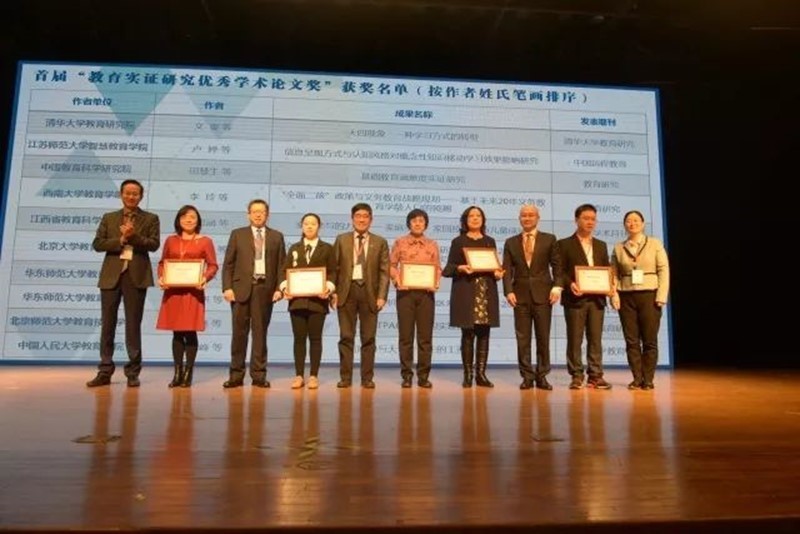
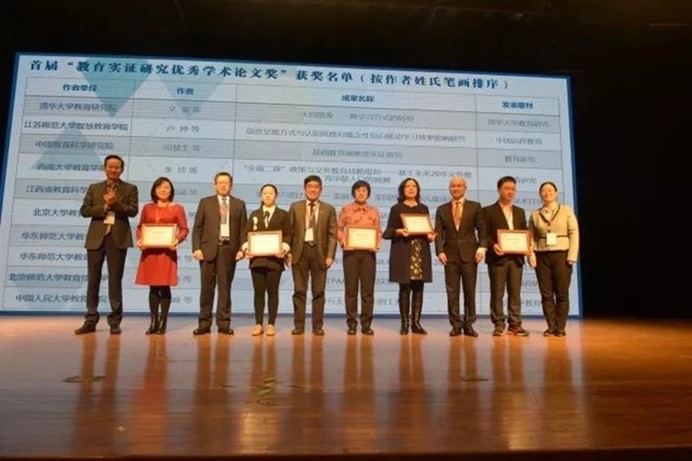
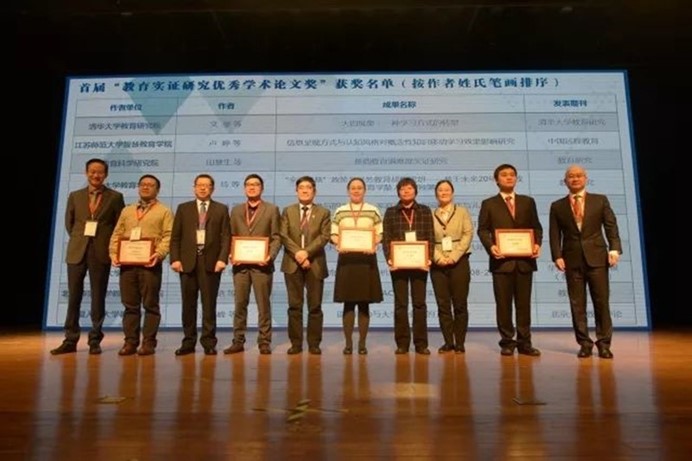
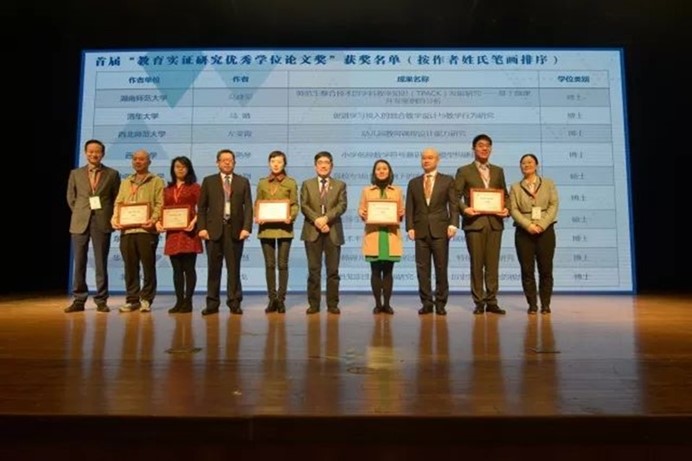
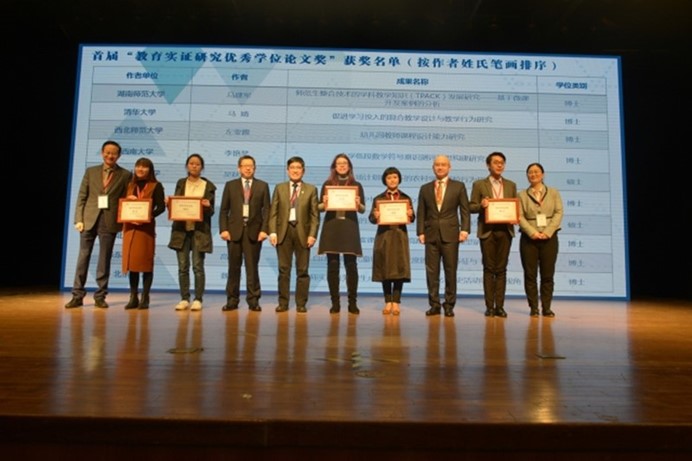
Tong Shijun, Yuan Zhenguo, Zhu Xudong, Shao Jianyu and Wang Qinghuan awarded prizes.
Theme Report
After the awarding ceremony, well-known scholars at home and abroad were invited to give speeches. They introduced the most cutting-edge and typical empirical researches around the world.
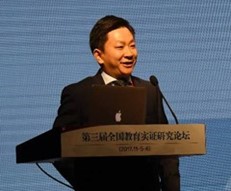
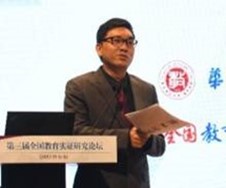
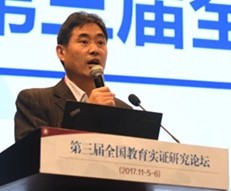
The three speeches were respectively chaired by Yang Fuyi, Ke Zheng and Huang Zhongjing from the Faculty of Education.
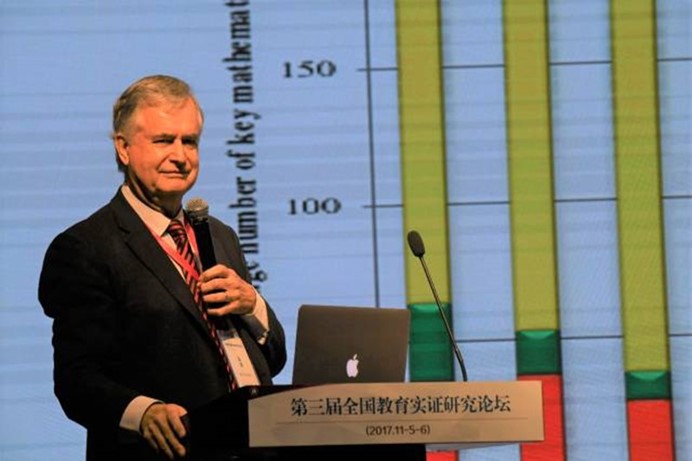
Prof. David Clarke while giving a report.
Prof. David Clarke, director of the International Classroom Research Center, University of Melbourne, gave a presentation titled “The Evolutionary Logic of Classroom Research: New Approaches, New Feasibility and New Challenges”. He pointed out that the logic of class research needs to relate the teaching activities of teachers to the learning outcomes of students, and at the same time, the adjusting and binding teaching activities and their achievements use should be based on both actual conditions and cultural events. He also recognized that the social characteristics of learning in the classroom would likely lead to problems among various methodologies. He said that although there were some shortcomings and limitations in the methods and research designs of different mathematics classrooms, classroom experiments proved their feasibilities and put forward new requirements and challenges as well.
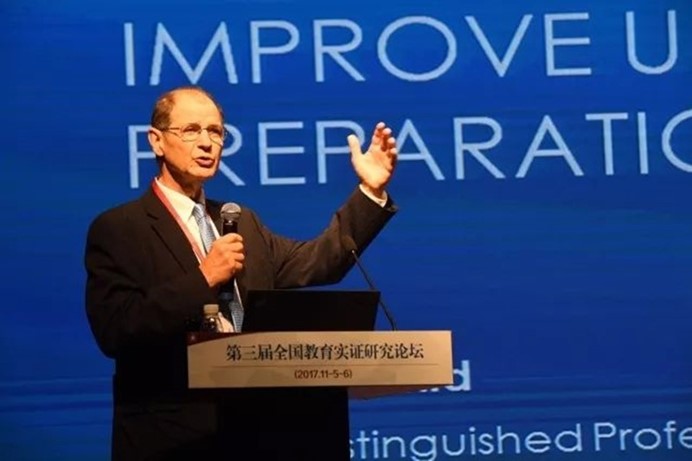
Prof. Bill McDiarmid while giving a report.
Prof. Bill McDiarmid, former dean of the College of Education, University of North Carolina at Chapel Hill, gave a report titled “Evidence of Change: Promoting the Cultivation of American Teachers Through Research”. First, he introduced the conditions of the training of American teachers by presenting a large amount of data and graphs. Then, he analyzed the reasons for the continuous decline of the number of American teachers in terms of financial input, teacher status and policy implications. Besides this, Prof. McDiarmid also proved how to carry out empirical research education in American teacher training. In the end, he shared some influential empirical researches in the field of training American teachers.
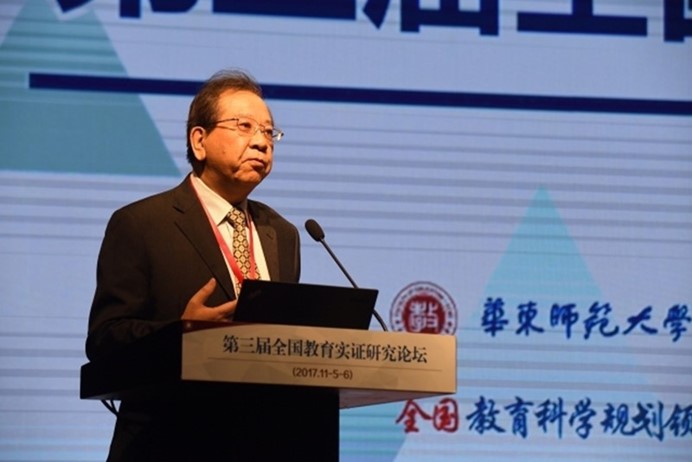
Prof. Chen Guoliang while giving his report.
Prof. Chen Guoliang (Dean of the Shanghai Academy of Education and Science, Executive Vice President of the National Institute of Macro-educational Policy and Director of the Basic Education Monitoring Center of the Ministry of Education), gave a report titled “National Education Decision-making and Empirical Research”. He introduced the operation of the National Science Decision-making Service System and believed that the establishment of this system, if based on data integration, could help to achieve various functions, such as the multi-dimensional comparison among data, the prediction and planning of development goals, and the construction and evaluation of them. At the same time, he also exemplified the situation of education in contiguous destitute areas and demonstrated the application of the national education decision-making system in education management and education researches.
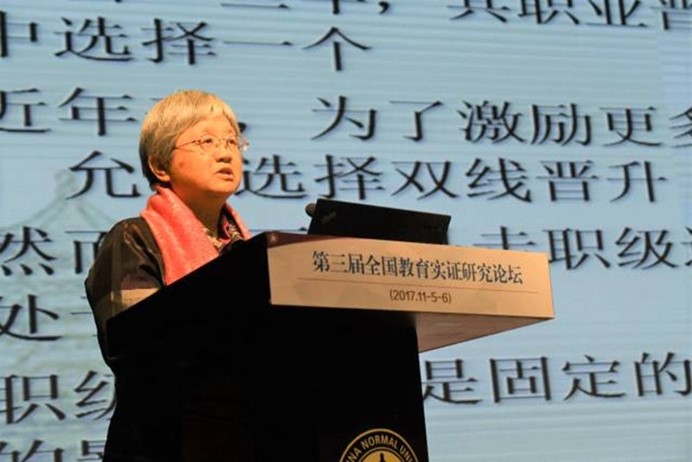
Prof. Chen Xiangming while giving a report.
Professor Chen Xiangming, from the Department of Education and Human Development, School of Education, Peking University, gave a report titled “Unexpected Consequences – Double-aspect Paradox of Promotions for College Counselors”. He analyzed the dilemmas faced by university counselors in the career advancement process. He believed that due to various mismatches (goals, contents, methods and resources), counselors were at a disadvantage for their promotion. Instead of promoting their “professionalization” and “specialization”, this two-line promotion system design has fundamentally led to the conflicts between the “good intention” and the unexpected result at the beginning of system design, which have led to the “Double-aspect Promotion Paradox”.
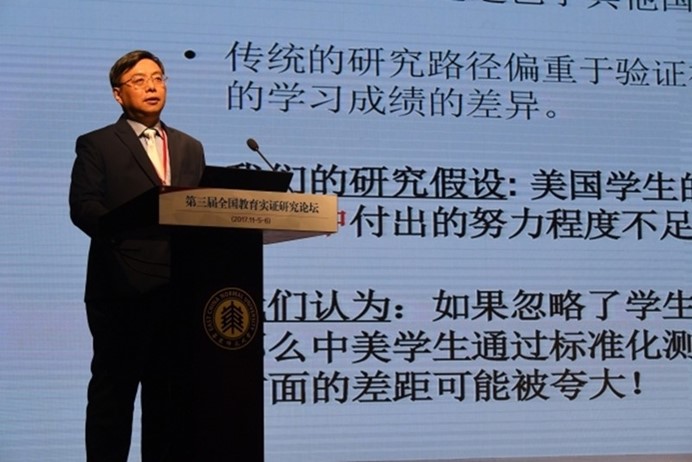
Prof. Qin Xiangdong while giving a report.
Prof. Qin Xiangdong, from the Department of Applied Economics, School of Economics and Management, Shanghai Jiaotong University, gave a report titled “Analysis of the Differences in PISA Results between China and the United States – Based on Experimental Economics”. He analyzed the reasons why Chinese students made good achievements in the PISA test. As an economist, he focused on how to prove that children who participated in the test made sufficient effort in the test. Scholars from the School of Economics and Management, Shanghai Jiaotong University and Department of Economics, the University of Chicago set up a joint project to conduct a comparative study in Shanghai and the United States. According to the research, financial incentives have much more of an impact on good students in the United States than students from Shanghai. It means that if the new external stimuli could inspire students who lack motivation, then their true abilities could be better demonstrated.
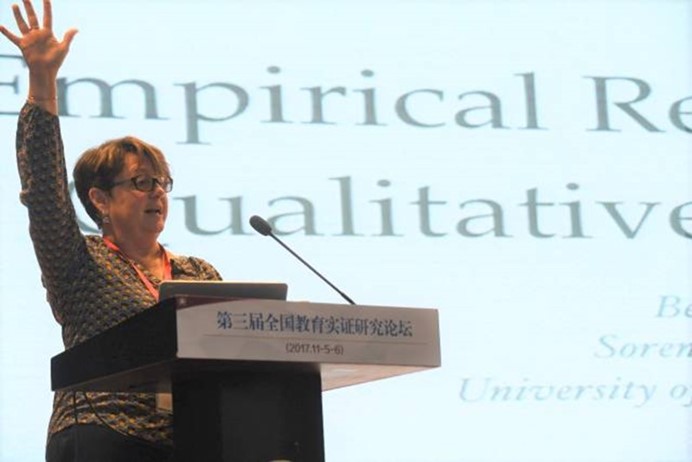
Prof. Elizabeth Graue while giving a report.
Prof. Elizabeth Graue, Dean of the Curriculum and Teaching Department, University of Wisconsin, gave a report titled “Empirical Research from the Qualitative Perspective”. She described several types of research questions that were effectively addressed by qualitative research methods and analyzed how to do so in a single or a small number of environments. She also demonstrated how to provide the same rigorous interpretation and assertion of large studies, which showed how she could combine several different datas that were often considered quantitative in several research projects and while deepening quantitative research with better explanations.
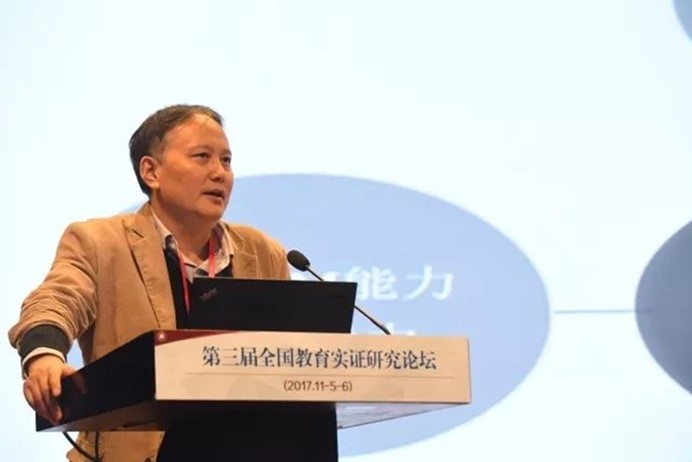
Prof. Peng Zhengmei while giving a report.
Prof. Peng Zhengmei, Director of the International and Comparative Education Research Department of ECNU, gave a report titled “Comparative Study of German and Chinese Students’ Moral Competence”. He introduced a project named ETiK in which its research background, theoretical basis, empirical principles and measurement tools which were jointly carried out by the International and Comparative Education Research Department of ECNU and Education Science Department of Humboldt University. He pointed out that the ETiK project aimed to develop an effective set of moral capacity models and measurement tools for Grade 10 students so as to make their knowledge and abilities learned in moral education courses as measurable as their mother tongue, foreign language, and mathematics of PISA test subjects.
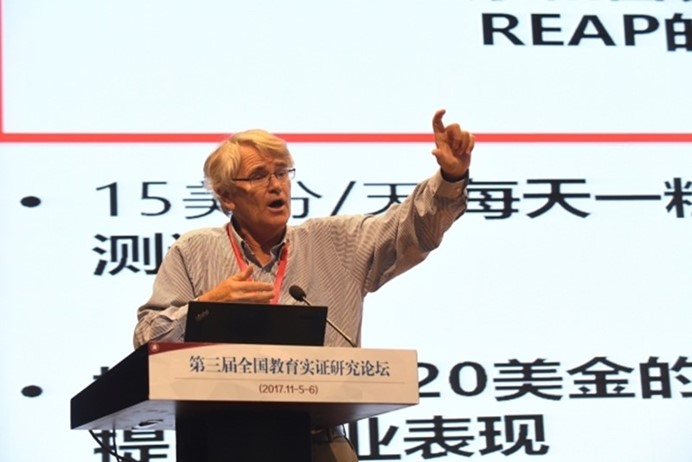
Prof. Scott Rozelle while giving a report.
Prof. Scott Rozelle, from the Institute of Economic Policy at Stanford University, gave a presentation entitled “Human Capital in Rural China: Crises, Sources, and Solutions”. He believed that with the rapid wage increase in recent years, China has no advantage in providing cheap labor resources. Therefore, we must upgrade our industry from the lower end to the higher end of the industrial chain. To win from the “industrial chain competition”, China must have a high-quality human capital reserve. And the biggest problem of improving overall quality of human capital in China was the gap between urban and rural human capital.
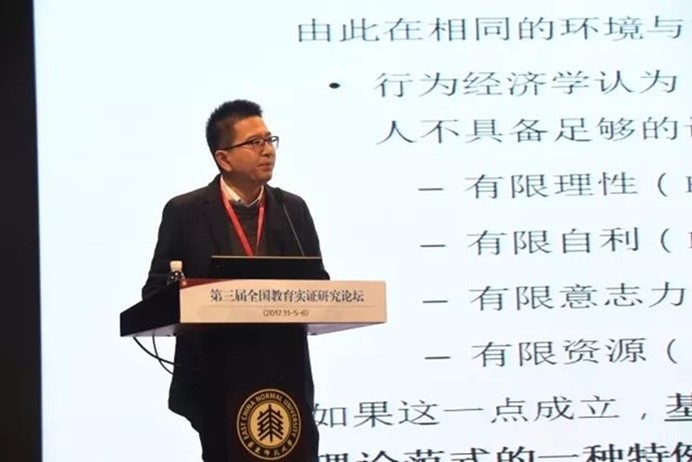
Prof. Huang Bin while giving a report.
Prof. Huang Bin, Dean of the School of Public Administration, Nanjing University of Finance and Economics, gave a report titled “Experimental Economic Methods of Education and Educational Scientific Research”. He referred to “Behavioral Economics” being a cross edge discipline that applied the cognitive theory and experimental methods of psychology directly to the analysis, interpretation and prediction of individual economic behaviors. This method was applied in the field of educational economy research. He believed that the application of behavioral experimental economics could form effective educational policy interventions and promote the development of educational scientific research.
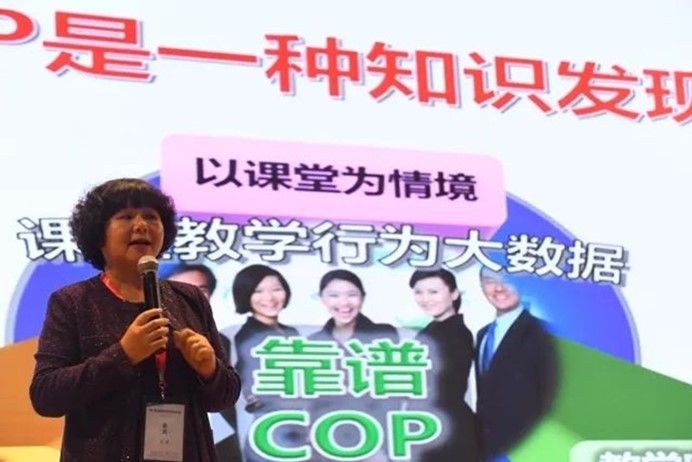
Prof. Wang Lu while giving a report.
Prof. Wang Lu, Director of the Key Laboratory of Modern Educational Technology, Capital Normal University, made a report titled “Knowledge Discovery Based on Big Data – An Analysis of Traits of Outstanding Teachers in COP”. She pointed out that COP brought the Knowledge-discovery Service based on the data analyzed in order to help teachers to achieve professional development. There are two important indicators in teachers’ professional development. One is the development and change of teachers’ practical knowledge of practice and the second is the improvement of classroom teaching behavior. These two aspects required the Knowledge-discovery Services to be more accurate, effective and reliable.
Sub-conference Report
The sub-conference report held on the second day was divided into five groups, focusing on “Education Policy and Its Impact”, “University Education Opportunity and Output”, “Teacher Knowledge and Professional Development”, “Curriculum and Teaching from Multi-Perspective” and “Learning Process and its Evaluation”. Fifteen outstanding paper authors and 20 empirical research outstanding achievement award winners were invited to make group reports.

The Third Forum on National Education Empirical Research has attracted the attention and participation of many educators both at home and abroad.
The forum will further promote the empirical study of education in China and contribute to the transformation of China’s education research.






